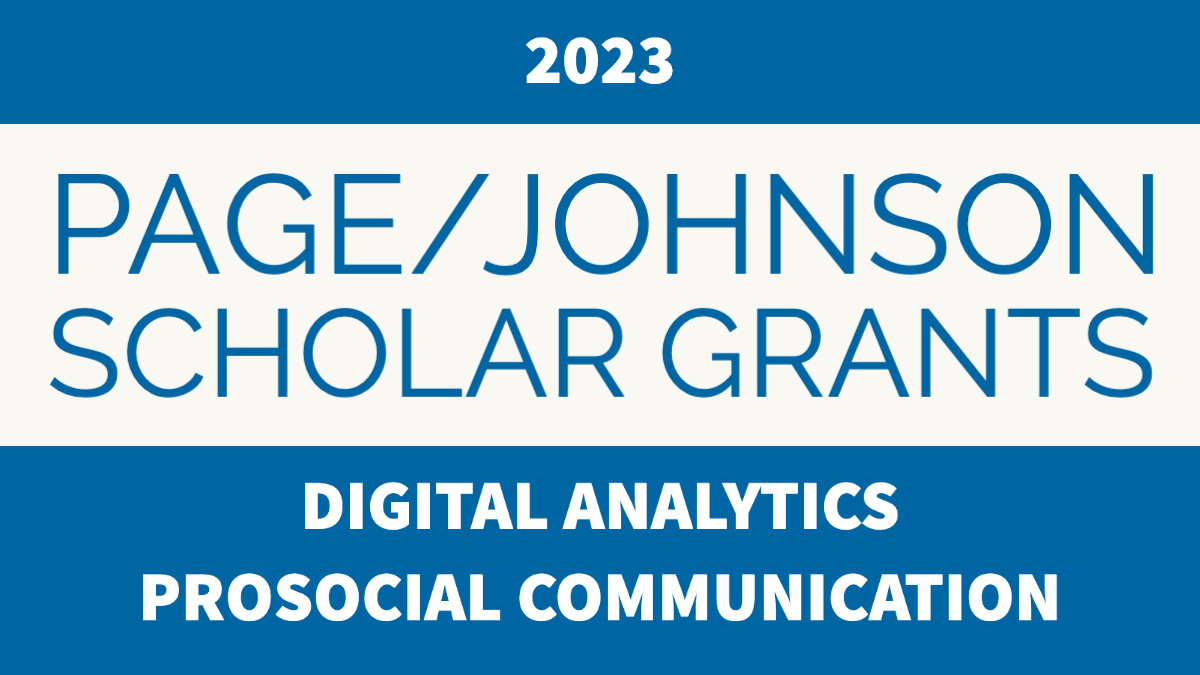Topics for 2023 research calls are digital analytics and prosocial communications
August 2, 2022 • Jonathan McVerry

The Page Center will be running two calls for research proposals this upcoming year as part of its annual Page/Johnson Legacy scholar program. Each call will seek innovative and novel research ideas addressing issues facing public communications today. The topics are digital analytics and prosocial communication.
Since 2004, the Page Center has funded hundreds of projects tackling many topics in the field. While research themes vary from year to year, the Center consistently supports academic exploration into the understanding of principles practiced in public communication.
For the full description of each call, visit the 2023 call for grant proposals page. All application materials must be submitted through Scholastica by Jan. 15, 2023. The digital analytics call will be moderated by senior research fellow Frank Dardis (Penn State) and the prosocial communication call will be moderated by senior research fellow Brooke McKeever (South Carolina).
Call: Effective and responsible use of digital analytics
Since the advent of online communication and its subsequent growth into constantly increasing digital, mobile and social-media platforms, the amount of data and information that can be harnessed by companies, brands, and organizations also has continued to grow apace. As industry and society now deal with current shifts by major tech companies and regulatory agencies regarding data-collection, disclosure, and transparency practices, it is crucial to understand the dynamics associated with digital analytics across contemporary strategic-communication, advertising, public relations, and marketing efforts.
The Page Center seeks grant proposals that will examine how companies, brands, organizations, or other entities currently are employing digital analytics to effectively maximize and optimize their communications efforts, while also doing so in an ethical and responsible manner. The goal of this project is to contribute to scholarly, industry, and public understanding about current practices and trends regarding the responsible implementation of data analytics.
"As industry and society currently navigates through issues like continuous technological breakthroughs in data collection and analytical tools," said Dr. Dardis, "it is imperative that organizations manage their data-analytics systems in efficient, yet ethical, means."
Learn more on the call page. Email Dr. Dardis with questions at: fed3@psu.edu.
Call: Prosocial Communication
Nonprofit organizations, government organizations working to improve public health or social conditions, Certified B Corporations or other corporations engaging in advocacy and activism –these entities often have goals that involve some form of prosocial communication. Similarly, the emerging field of Public Interest Communications (PIC) uses communication grounded in research and strategy to achieve sustained positive social change.
While the goal of prosocial communication is usually rooted in good, the strategies and tactics used to achieve the desired goals can be questionable. For instance, efforts to raise awareness may involve images, words, or tactics meant to shock or capture the attention of media, the public, or people in power. Some forms of communication are designed to generate sympathy, fear, or other emotions with the goal of getting people to act in some way.
Many scholars have written about communication ethics, including Baker and Martinson (2001) who developed the TARES test for persuasive communication, and Freeman (2009) who discussed the need for flexibility in such guidelines when it comes to social movement organizations. As advocacy and activism efforts continue related to various causes, more research is needed to understand the possible issues involved in prosocial communication.
"With health and social issues being so prominent in recent years, more research on how to communicate ethically about these issues is vital to those of us working in these areas as well as to the public at large," Dr. McKeever said. "The Page Center has a history of supporting impressive scholars, and I’m excited to see a variety of interesting proposals with this call."
Learn more on the call page. Email Dr. McKeever with questions at: brookew@sc.edu.

